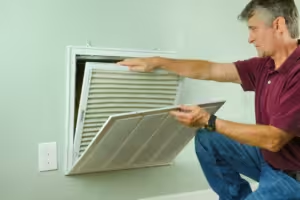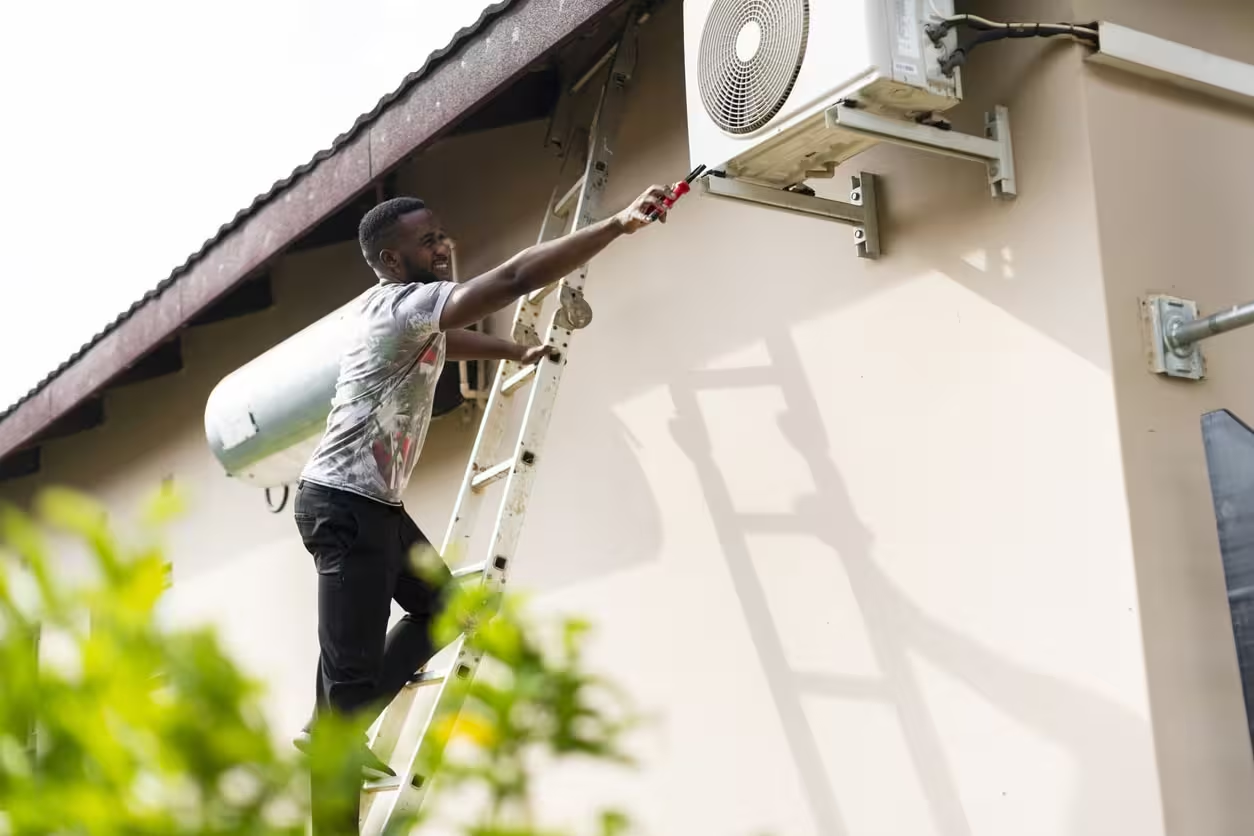If you’re handy with home repairs, you may be thinking about performing DIY HVAC maintenance in order to save money. While some repairs are safe and simple, others require technical knowledge, specialized tools, or pose a risk for electrical shock, carbon monoxide poisoning, or fire. Read on to learn about when you should tackle HVAC repairs yourself and when you should leave them to a professional.
DIY Repairs
Here’s a list of repairs you can safely and easily do yourself:
Change the Air Filters: Although it may seem insignificant, a clogged air filter can cause complete HVAC failure. When it doesn’t properly filter contaminants, they lodge in your system and jam moving parts such as valves and fan motors. As these components struggle to function, they can trigger a system breakdown. You can choose from disposable, paper filters which can easily be swapped out every three months, or metal filters, which can be washed with a garden hose and reused. Simply turn your HVAC off, remove the access panels, remove the old filter and replace it with a new one.

Replace Your Thermostat: A faulty thermostat can cause your HVAC to continually turn on and off, short-cycle, perpetually run, and struggle to maintain a consistent temperature. Thermostat issues can damage or shut down the system. To troubleshoot an ailing thermostat, first, replace the batteries. If this doesn’t work, check the thermostat’s sensors. You’ll need to replace the thermostat if the sensors are damaged, or if there is corrosion or faulty wiring. Thermostats generally have a 10-year lifespan, so yours may simply be malfunctioning because it’s old and outdated. This is a good opportunity to upgrade to a more precise and efficient programmable thermostat. These come with instructions, so you can easily install them yourself.
Check Your Condenser: Your condenser’s job is to remove heat from your house and carry it outdoors. When it malfunctions, airflow becomes restricted throughout your entire house, stressing the HVAC’s components. Before checking your condenser, turn off the power at both your thermostat and the circuit breakers. Next, make sure your condenser is level. If not, simply align it with its concrete base. You can also try removing accumulated leaves, twigs, branches, and other debris that’s fallen in, and trim back trees and shrubs that may interfere with airflow.
Melt Ice: If your unit isn’t adequately cooling, check it for ice. Melt the ice by simply turning the unit off and running the fan.
Remove Duct Blockage: When a vent is blocked, air will continue to push against it, causing increased pressure that can damage your system’s heat exchanger and cause ductwork leaks. To troubleshoot this issue, remove dirty vents with a screwdriver, clean them with soap and water and then inspect the duct. If the clog is near the vent opening, you may be able to remove it by hand. The problem could be more than one clog, so be sure to check all of your vents for obstructions.
Call a Pro
Problems that involve electricity, need specialized tools or require technical knowledge should be handled by an HVAC professional. These include:
Repairing an Issue That’s Causing a Burning Odor: When you first turn on your heater in the winter, dust that has accumulated on it during warmer weather may produce a burning smell. This is normal. However, if the odor doesn’t go away, it may be caused by frayed wires and should be immediately repaired by a professional.
Repairing a Problem That’s Causing Strange Noises: Normally, HVACs run quietly, but if yours bangs, shrieks, squeals, or grinds, it’s telling you it needs to be repaired. These sounds can signify anything from a loose part to a pressure buildup that could cause an explosion. If you hear any of these noises, call a technician as soon as possible, so they can make a professional diagnosis and perform suitable repairs.
Malfunctioning Fans: Your air conditioner has an indoor and an outdoor fan. If they stop working, they should be fixed by a pro, since the repair is complex and requires specialized parts. A professional can also determine if the damage is significant enough to require replacement of the entire HVAC unit.
A Motor That Stops Running: Your HVAC motor may abruptly stop working. The issue could be something as simple as dust buildup, or more serious, such as an electrical malfunction. As with all electrical issues, it’s best to call a professional who is trained to safely handle problems involving electricity.
Leaks: Leaks can be hard to detect and difficult to trace. An HVAC professional has experience with special tools that easily and quickly find the culprit. Since a leak can indicate a critical issue, it’s best to call a technician as soon as possible before it worsens.
Contact Us
If you have a knack for home repairs, you can try some of the ones listed above. However, there are some that should be left to Progressive Air Systems’ professionals, who are trained to handle difficult or dangerous issues. Make things easier on yourself by calling the experts at Progressive Air Systems today.

